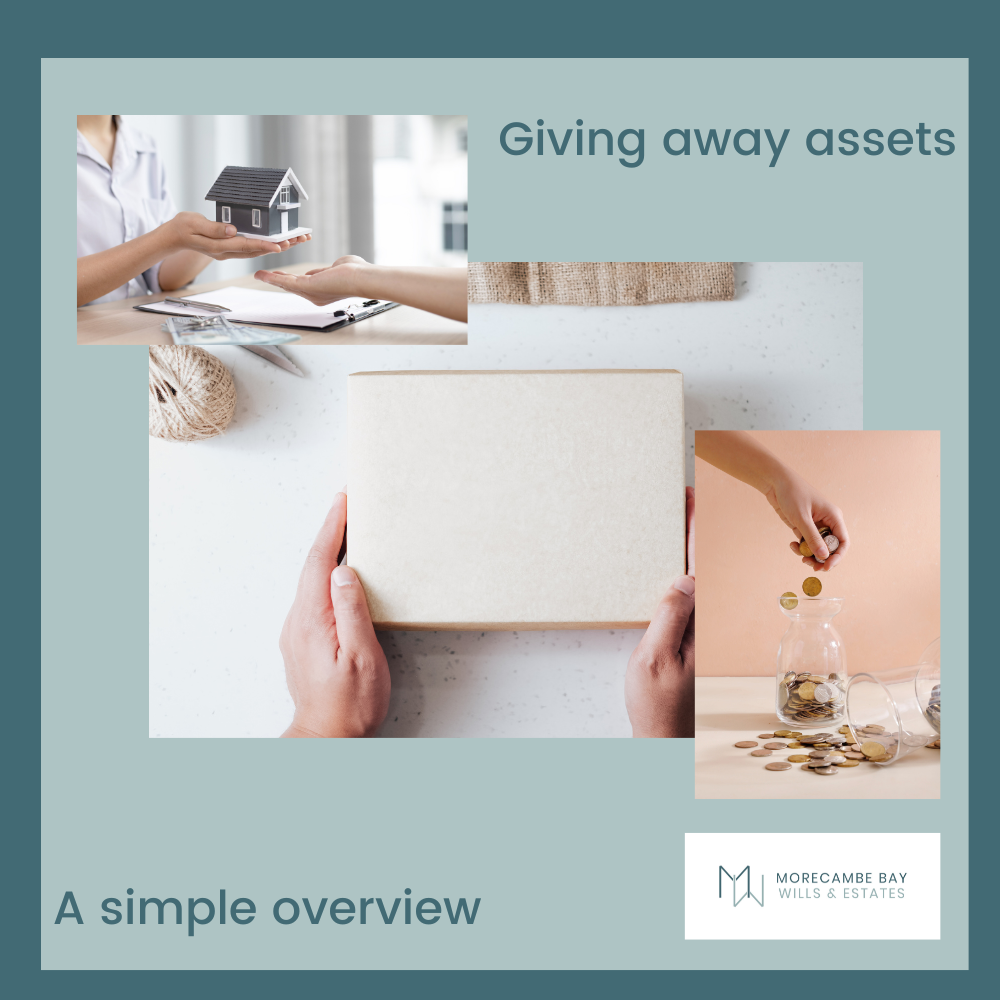Lifetime Gifts. What are they and how do they affect Inheritance Tax?
When I speak to clients there are lots of people who tell me “I can only give away £3,000 a year”. Or “I can give away money and then survive 7 years and not pay care fees”.
So, there is a lot of misunderstandings, myths and confusion about Lifetime Gifts. This short blog aims to provide a simple overview. If you want more detailed information, then please book in for a chat, or check the government website here.
The basics
What is a Lifetime Gift? Well simply put, it’s assets (money, property, shares etc) that you give away while you are alive (rather than in your will when you die). A good example is you give your son £10,000 to buy a car, or your daughter a large sum of money as a deposit n a house.
But it can also be a share of a property – including selling your house to your children for a lower than market price. For example, if you sold them your £300,000 house for £200,000 then £100,000 of this would be seen as a gift.
What can I give and when?
Many people know you can give away assets in your lifetime – and most people do this to avoid Inheritance Tax. But what can you give away and how can Lifetime Gifts reduce the size of your estate for IHT purposes?
- Everyone has an annual tax-free allowance of £3,000 that can be given away.
- In addition, you can give unlimited small gifts (£250 max) for birthdays, anniversaries etc from your normal income.
- You can also give gifts of up to £5,000 for a wedding, depending on who is getting married.
All of these can add up and over time can reduce your taxable estate. But there is more you can do – you can give larger Lifetime Gifts from surplus income or from savings, with some catches.
- If you are regularly receiving more than you spend, and can prove that, then you can make unlimited gifts from your income. But it must come from your current account, and you must keep detailed records showing it doesn’t affect your lifestyle.
- You can give larger gifts and take advantage of the “7-year rule”. That means if you live 7 years after making the gift, it will no longer be classed as being in your estate when you die. Of course, you can make several of these over the years to reduce your assets – the sooner you start, the more likely it is to avoid IHT.
As you can see Lifetime Gifts can be much more than the £3,000 a year that many people think is the limit.
When is a gift not a gift?
When it’s a GROB !!!! What on earth does that mean?
It stands for Gift with Reservation of Benefit. That basically means you gave a gift but still benefit from it. The most common example is giving your house to your kids but still living there rent free. Or you give your Buy-to-Let property to your grandson, but the income still comes to you. Basically, you haven’t really given a gift – because you still benefit from it.
The only way to truly gift things like property is for you to pay market rent if you still live there, or give up the rights to any income for e.g. rental property.
Who is checking?
Your Executors, appointed in your Will, have a duty to find out what gifts, if any, were made in the 7 years prior to you dying. That could mean going back through 7 years of bank statements or asking family if they received any gifts. All of which is time consuming.
Gifting can be an amazing thing to do for those you love. But if you do it, keep a paperwork trail! Making a Will and keeping good records are some of the kindest things you can do for those who have to sort out your stuff when you are no longer here. Make it easy for them!
And those care fees?
Most importantly – the “7-year rule” is NOT related to care fees. Local Authorities can go back much longer than that to see if you made gifts that would reduce your assets with the sole purpose of reducing your assets to avoid any liability for care fees. This is called Deliberate deprivation of Assets. So, if someone tells you that this is possible it isn’t.
How can we help?
When we talk to you about your Will, we also go through your financial position too. That way we can advise you of your current inheritance Tax allowances, and any actions you may wish to take regarding Lifetime Gifts.
If needed, we can put you in touch with one of our network of trusted financial advisors for further help and assistance with tax issues.
Whatever your situation, we want to make sure you know about, and understand, what IHT means for your own individual circumstances. And help you to act if it’s needed – now or in the future.
Contact us on 01524 5710232 to arrange an appointment, or a FREE 30-minute consultation. Or ask for any of our Information guides here. We are here to help!


